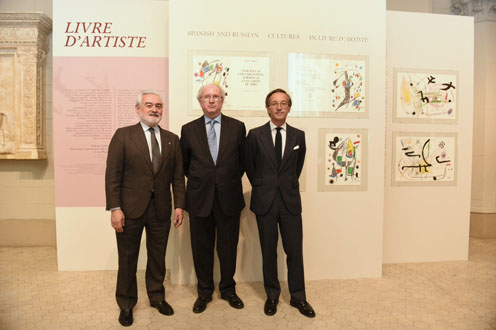At the Pushkin State Museum of Fine Arts in Moscow
The State Secretary for Culture inaugurates the Year of the Spanish Language and Literature in Spanish in Russia
News - 2015.4.27
The aim of this initiative is to promote awareness of the Spanish language and the literary traditions of Spain and other Spanish speaking countries in Russia, and to encourage mutual cooperation and understanding. To this end, the Spanish Embassy in Russia and the Cervantes Institute have organised a schedule of events open to the participation of all Spanish speaking countries, which are home to over 500 million Spanish speakers worldwide.
As well as the Secretary of State for Culture, our country was represented in the inaugural ceremony by the Director of the Real Academia de la Lengua (Royal Language Academy), Darío Villanueva, and the Spanish Ambassador in Moscow, José Ignacio Carbajal. Representing Russia were the Deputy Minister for Education and Science, Benjamin Shaevich Kaganov, the Deputy Minister for Culture, Alla Yurievna Manilova, the Special Representative of the President of the Russian Federation for international cultural cooperation, Mikhail Shvydkoy, and the Director of Pushkin Museum, Marina Loshak. Also taking part were the Chilean Ambassador and Deputy Dean of the GRULAC group of countries (Latin American and Caribbean Group), Juan Eduardo Eguiguren.
During the ceremony a tribute was paid to Miguel de Cervantes, with a reading of a fragment of El Quijote and a performance by the baroque music group, Zarabanda, who played a selection by Spanish composers of the 16th and 17th centuries: Diego Ortiz, Antonio de Cabezón, Luis de Narváez, and Andrea Falconieri. The concert was entitled "Where there's music there can't be mischief", a phrase immortalised by Sancho Panza in the second volume of Don Quijote de la Mancha.
The exhibition "Livre d'artiste", from the private collection of Boris Fridman, was also opened, containing the graphic work produced by Joan Miró for the poems of Rafael Alberti, and that by Antoni Tàpies for the work of the Russian poet, Joseph Brodsky.
Scheduled activities
Among the main activities confirmed for the Year of the Spanish Language and Literature in Spanish, are:
- The exhibition "Spain and Russo-Spanish relations in the collections of the Pushkin House, St. Petersburg", which will be inaugurated in June and will be funded by the Russian Institute of Literature, whose director is the Hispanist academic, Vsevolod Bagno.
- María Pagés's ballet "Yo, Carmen", at the Mossovet Theatre. From May 28 to June 1.
- Participation in the "Non-Fiction" book fair, the leading new book and literature fair in Russia, in which Spain is aiming to have a strong presence. November.
- Continuation of the publishing programme in conjunction with the All-Russia State Library for Foreign Literature. Publication and presentation (with parallel activities) of the books: Poesía popular española (Popular Spanish poetry: bilingual edition, with CD), Viajeros rusos por España (Russian travellers around Spain: second volume), and Lenguas de colibrí (Hummingbird tongues). Events with the participation of Russian specialists and specialists from the Hispanic world. The book Lenguas de colibrí, which will bring together an anthology of 108 micro-stories, translated by 108 Russian translators, will consist of a kind of encyclopaedia of the Russian school of translation, from the classics like Anatolii Gueleskul, Boris Dubin and Valeri Stolbov to the most recent generation of translators.
- Meeting of Spanish translators. Hispanic panel in the framework of the IV International Conference on Translation. All-Russia State Library for Foreign Literature. September.
- Regional Olympics for Spanish as the first foreign language in the Moscow State Linguistic University; Regional Olympics as first or second foreign language in St. Petersburg; Olympics of Spanish as a foreign language in Moscow, in collaboration with the National Association of Spanish Language Teachers and the Russian Academy for In-Service Teacher Training. This is the first time that the Spanish language has been officially included in the academic Olympics in Russia.
- Fifth Conference of Hispanists, coordinated by the Association of Hispanists of Russia and the Moscow State Linguistic University. Autumn.
- Call for submissions for the "First Ambassadors' Prize" for the best translation of Spanish to Russian, an award created by the embassies of the group of Spanish speaking countries. The prize will be awarded on an annual basis.
- Conference: "Art in Russia and Spain: universal values and national languages". Russian State Institute of Fine Arts (CII). Autumn.
- Concert of zarzuela and Spanish song in Pyatigorsk and Kislovodsk. Orchestra conductor Borja Quintas, soprano Ruth Iniesta, and tenor Vicente Ombuena, with the Kislovodsk Philharmonic Orchestra (North Caucasus). May 29 and 30.





